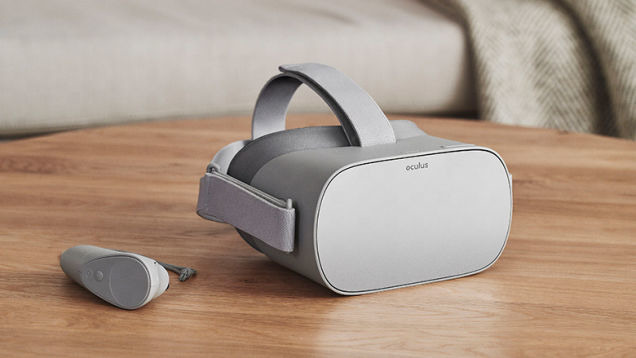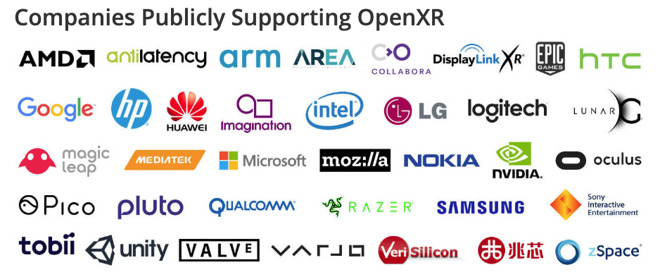Apple missing from list of companies supporting OpenXR AR and VR spec
The Khronos Group has ratified and publicly released a provisional specification for OpenXR, an open standard for AR and VR platforms, but while many major firms are supporting the effort, Apple does not appear to be publicly offering its own support.

Facebook's Oculus Go VR headset
Launched during the Game Developer Conference on Monday, the OpenXR 0.90 provisional specification advises of a cross-platform API that can take advantage of XR-supporting hardware. The API would offer access to common sets of objects and functions required for applications, including those to do with rendering, tracking frame timing, and input, items that would typically vary between different hardware producers.
The aim of the project is to define the API so developers only need to code once for all hardware under the scheme, instead of producing software with differences that apply to specific headsets. This would in theory simplify development and could enable developers to release apps that are suitable for use on many different devices at a quicker rate.
"OpenXR seeks to simplify AR/VR software development, enabling applications to reach a wider array of hardware platforms without having to port or re-write their code and subsequently allowing platform vendors supporting OpenXR access to more applications," said Brent Insko, lead VR architect at Intel and OpenXR working group chair. "The OpenXR provisional specification-- together with the runtimes publicly available at launch and coming in the next few weeks-- will enable hands-on, cross-platform testing by application and engine developers."
The Khronos Group is an open industry consortium that counts over 140 hardware and software companies within the 3D graphics, AR and VR, computer vision, and machine learning fields. The group publicly supporting OpenXR includes AMD, ARM, Epic Games, HTC, Google, Intel, Microsoft, Oculus, Qualcomm, Samsung, Sony, Valve, and others.

A list of firms publicly supporting OpenXR, which currently does not include Apple (via the OpenXR website)
While Apple is part of the Khronos Group as one of its Promoter Members, which means it has full working group participation, it isn't included in the list of firms publicly supporting OpenXR. It is unclear why Apple is not on the list at this time, but not being included is not the same as not supporting the project.
Apple has put considerable effort towards its AR and VR projects, such as ARKit, which is used by developers to add AR experiences to iOS apps. It is also believed to be working on some form of smart glasses or headset that uses AR or VR, and has filed numerous patents in the field, with analysts suggesting the earliest such a device could launch would be in 2020.
It would be expected that, since it is a promoter member of the overall group, Apple would at least have some interest in what develops with OpenXR.

Facebook's Oculus Go VR headset
Launched during the Game Developer Conference on Monday, the OpenXR 0.90 provisional specification advises of a cross-platform API that can take advantage of XR-supporting hardware. The API would offer access to common sets of objects and functions required for applications, including those to do with rendering, tracking frame timing, and input, items that would typically vary between different hardware producers.
The aim of the project is to define the API so developers only need to code once for all hardware under the scheme, instead of producing software with differences that apply to specific headsets. This would in theory simplify development and could enable developers to release apps that are suitable for use on many different devices at a quicker rate.
"OpenXR seeks to simplify AR/VR software development, enabling applications to reach a wider array of hardware platforms without having to port or re-write their code and subsequently allowing platform vendors supporting OpenXR access to more applications," said Brent Insko, lead VR architect at Intel and OpenXR working group chair. "The OpenXR provisional specification-- together with the runtimes publicly available at launch and coming in the next few weeks-- will enable hands-on, cross-platform testing by application and engine developers."
The Khronos Group is an open industry consortium that counts over 140 hardware and software companies within the 3D graphics, AR and VR, computer vision, and machine learning fields. The group publicly supporting OpenXR includes AMD, ARM, Epic Games, HTC, Google, Intel, Microsoft, Oculus, Qualcomm, Samsung, Sony, Valve, and others.

A list of firms publicly supporting OpenXR, which currently does not include Apple (via the OpenXR website)
While Apple is part of the Khronos Group as one of its Promoter Members, which means it has full working group participation, it isn't included in the list of firms publicly supporting OpenXR. It is unclear why Apple is not on the list at this time, but not being included is not the same as not supporting the project.
Apple has put considerable effort towards its AR and VR projects, such as ARKit, which is used by developers to add AR experiences to iOS apps. It is also believed to be working on some form of smart glasses or headset that uses AR or VR, and has filed numerous patents in the field, with analysts suggesting the earliest such a device could launch would be in 2020.
It would be expected that, since it is a promoter member of the overall group, Apple would at least have some interest in what develops with OpenXR.

Comments
I think that Apple will want to optimize as much as possible in hardware, necessitating it's own API's.
This pretty much follows what Kronos did with Vulcan, following Apple's Metal II in a more generic way, for mobile devices. I don't think that anyone would state that Vulcan is superior to Metal II technically, only that the available Android OS Platform really has no other options to date.
Developers didn't complain about DirectX (vs. OpenGL)
Developers don't complain about nVidia CUDA (vs. OpenCL)
It doesn't make it difficult for developers to get on board to a platform with a device base of a billion and counting.
I don't read anything special with Apple at this stage signing onto OpenXR or not. Everybody is jockeying for position and in the end one or two standards will rise to the top and then everyone will fall into the two camps and duke it out. Betamax vs VHS.....
(anytime I read a comment that begins with “Apple needs to...!” I cringe. Usually it’s just a substitute for “I want Apple to...”)
As you stated: "not being included is not the same as not supporting the project"
Apple, by virtue of being one of the Promoter members of the Khronos Group, is effectively part of the top-level board of directors and participates at a governance level over all specifications and working groups within the Khronos Group. That constitutes a very meaty commitment at both a financial and hands-on-deck level. Unless Apple comes out publicly in opposition to OpenXR or withdraws from the Khronos Group we can safely assume that they are engaged and implicitly support all specifications and working groups under the umbrella of the Khronos Group.
There is a big difference between a company supporting open standards through membership and participation in group activities and a company limiting itself to exclusively supporting only the open standards when it comes to designing and producing their own products. They can do both as long as their proprietary standards do not interfere with or invalidate the open standards.
Well, if they’re not supporting it, then you can’t look at evidence the other way, can you? But we can look to the dearth of certain types of graphics dependent software. And developers do complain about it. Games, for example, are difficult to move over because Apple’s own graphics software standards don’t support a lot of what these do. When they do, it’s differently. So it has to be rewritten.
and what’s the point? Just saying that a-les solution is superior isn’t saying much, even if it were true. Often, being slightly better is inferior to agreeing on a standard. And Apple could influence those standards if they belonged to the bodies, or were just a major implementer. Apple sits on a number of standards bodies, so it’s not as though they never bother.